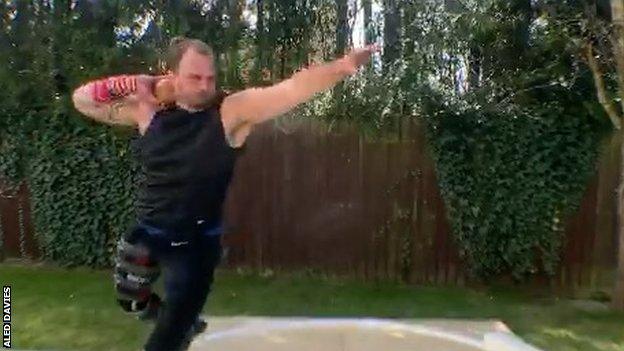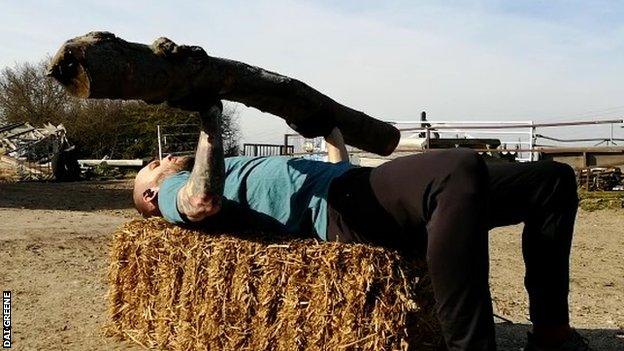Coronavirus: Welsh Athletics faces a ‘huge challenge’ to resume
- Published
How Wales' top athletes have adapted their training during lockdown
The resumption of athletics in Wales - even at an elite level - is going to be "a long process", according to the sport's governing body.
Changes to the sport are "inevitable", says James Williams, interim chief executive of Welsh Athletics.
On Thursday the Welsh Government allowed professional footballers to resume training and said it was aiming towards a 'safe return to all sport'.
But Williams says athletics faces "a huge challenge" before returning.
"We have to be realistic," Williams told BBC Sport Wales.
"You have a sport like football where they can put in place daily testing if needed. They can work within confined environments and control those environments.
"Couple that with a sport like athletics where we don't own our own facilities and we are dealing with a huge number of individuals who don't necessarily train in the same place at the same time in the same way. Our ability to put in place a certain level of testing is nigh on impossible.
"The big challenge will be to manage expectations of our athletes."
Wales' athletics tracks and indoor facilities are almost all owned by local authorities, universities or schools.
There is an acceptance in the governing body that their priority will be the safety of staff and students before external partners are allowed access again.
Chasing lambs and hammer throwing in fields

At the Rio Paralympics in 2016, Aled Davies won a gold medal in the F42 shot put
That could leave Wales' top athletes training at their homes or in parks for a while yet.
With many targeting the rearranged Tokyo Olympic and Paralympic Games next summer, an extended break from the sport is not an option.
Makeshift gyms in gardens and garages have become commonplace. Training plans need to be a little more creative.
Sprinter Sam Gordon says he feels like he's "in a Rocky film", hill sprints and outdoor gym sessions have replaced the relative luxury of an indoor track and gym.
Marathon runner Dewi Griffiths says lambing season on his family farm has given him plenty of sheep to chase. And with a 16-pound hammer to practise throwing, Osian Jones is lucky to have access to a family friend's field.
With training able to go on in some form, and the coronavirus outbreak still a concern, even if facilities did re-open not every athlete would return immediately.
"I'd love to compete this year," says Paralympic and world champion shot putter Aled Davies, who is able to carry on training thanks to a throwing net in his garden.
"But I'm not going to put my family's health at risk for that.
"This virus can kill you. Especially with my medical history and my family's medical history, you just need to be careful.
"I want to look after them and if it means sacrificing a few months then that's ok. I can deal with that."
Events and races need 'creative solutions'

Dai Greene won the last of his British Championships titles in 2018
Athletics is one of more than 60 sports in regular contact with the Welsh Government.
Many are hoping to see renewed guidance on elite sport training as part of the next lockdown review next week.
But an even bigger challenge could be holding competitions and races again.
"I think it's clear that the mass participation events and large gatherings that previously our sport saw on an almost weekly basis is going to be some time off," admits Williams.
"We have to be innovative and try new things. We've seen a huge spike in virtual races where people are running individually but connected by virtual means.
"Everyone will have to come with us on this process."
It is a process that will affect every club and social runner too.
Athletics clubs almost entirely rely on membership fees to survive and there are fears a long period without events will see athletes drop out of the sport.
Everyone at the top of athletics recognises the health of the nation will remain the overwhelming priority. The health of their sport is a challenge still to come.